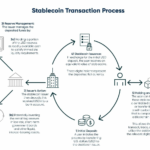The decentralized finance (DeFi) ecosystem continues to redefine how financial services operate, and one of its most transformative innovations is institutional liquidity pools. These advanced mechanisms are designed to address the needs of large-scale participants by offering robust infrastructure, high scalability, and reliable returns. In a market traditionally dominated by retail participants, institutional-grade liquidity pools are paving the way for scalable, efficient digital asset investment strategies.
What Are Institutional Liquidity Pools?
Liquidity pools are essentially reserves of digital assets locked within smart contracts to enable trading, lending, and other financial activities on decentralized platforms. While retail liquidity pools focus on providing services for smaller participants, institutional liquidity pools cater to large-scale players such as hedge funds, corporations, and crypto investment companies.

Institutional liquidity pools offer enhanced features like regulatory compliance, lower slippage, advanced analytics, and access to higher liquidity levels, making them an attractive option for entities managing substantial portfolios. Many blockchain asset investments consultants and digital asset management consultants have identified these pools as critical infrastructure for scaling institutional participation in DeFi.
Benefits of Institutional Liquidity Pools
Institutional liquidity pools represent a leap forward in the DeFi landscape, offering sophisticated features and tailored solutions to meet the demands of large-scale participants. By addressing limitations of traditional retail liquidity pools, they open up new avenues for strategic participation in decentralized finance. Below is an in-depth look at the advantages these pools bring to institutional participants:
1. Scalability and High Liquidity
Institutional liquidity pools are designed to handle the scale and demands of large transactions, often maintaining reserves significantly larger than those in retail DeFi pools. This ensures participants can execute high-value trades without causing substantial price movements or suffering from slippage.
For instance, a 2023 report by a global digital asset consulting firm revealed that liquidity in institutional-grade pools often surpasses retail pools by a factor of 10, creating unprecedented opportunities for high-volume trades. This makes them indispensable for entities like hedge fund investment companies and portfolio management consultants who require deep liquidity for efficient operations.
Moreover, these pools support advanced liquidity provisioning algorithms that dynamically adjust to market conditions, ensuring optimal asset allocation. With this scalability, institutional participants can seamlessly handle billions in assets, paving the way for mainstream adoption of digital asset portfolio management and investment analysis and portfolio management solutions.
2. Stable Yields
A major challenge with traditional DeFi liquidity pools is their susceptibility to market volatility and impermanent loss, which can significantly affect returns. Institutional liquidity pools mitigate these risks by employing advanced mechanisms to stabilize yields, making them more predictable and attractive for long-term participants.
Key features include over-collateralization, integration with Stablecoins for investment, and sophisticated algorithms that optimize returns while maintaining minimal risk. These features ensure consistent performance, even during periods of high market turbulence.
For example, a blockchain asset investments consultant might recommend institutional pools for clients seeking predictable returns to fulfill stringent financial obligations. Similarly, DeFi finance consulting services frequently highlight these pools to onboard clients requiring stable income streams without exposing their capital to undue risk.
Additionally, the inclusion of stable yield instruments like tokenized government bonds or real-world assets (RWA) further enhances return predictability. Such options are increasingly endorsed by real world assets crypto investment consultants and RWA tokenization investment consultants as reliable hedges against market fluctuations.
3. Regulatory Compliance
One of the primary hurdles for institutions entering DeFi has been the uncertainty surrounding regulatory compliance. Unlike retail-focused pools that often operate in less regulated spaces, institutional liquidity pools are designed to adhere to stringent compliance frameworks.
These pools incorporate robust Know Your Customer (KYC) and Anti-Money Laundering (AML) protocols, ensuring adherence to legal requirements. For example, a digital asset consulting for compliance service may guide the setup of these pools to ensure they meet international standards, making them viable for cross-border participation.
Moreover, institutional liquidity pools often integrate with Security tokens investment consultants to tokenize assets in compliance with security laws. This approach not only mitigates regulatory risks but also instills confidence among participants wary of legal ambiguities.
By operating within clear regulatory boundaries, these pools attract institutions like crypto investment companies and digital asset management companies, bridging the gap between traditional finance and the decentralized ecosystem.
4. Customizable Investment Strategies
Institutional investors often have diverse goals and varying risk appetites, necessitating flexible and tailored solutions. Institutional liquidity pools offer customizable parameters to align with these unique requirements.
Features such as adjustable lock-in periods, tailored risk profiles, and access to specific asset classes empower participants to fine-tune their investment strategies. For instance, altcoin investment options and tokenized RWAs are accessible within these pools, enabling participants to diversify portfolios efficiently.

Moreover, the inclusion of algorithmic trading tools and performance analytics helps institutions optimize yields while maintaining risk thresholds. Digital assets consulting firms often recommend these pools to institutions seeking highly specialized investment vehicles.
Customizability also extends to governance. Many institutional liquidity pools provide stakeholders with voting rights, allowing them to influence operational decisions and pool parameters. This participatory model is increasingly supported by blockchain and digital asset consulting services to enhance client engagement.
Additionally, institutions can align their strategies with ESG (Environmental, Social, and Governance) goals by incorporating tokenized carbon credits or sustainable investments into their portfolios. Such features are particularly popular among real world asset consultants and real world DeFi investment consultants aiming to attract socially conscious participants.
The Mechanics of Institutional Liquidity Pools
Institutional liquidity pools represent a significant evolution in decentralized finance (DeFi), leveraging cutting-edge technologies and strategies to cater to the unique needs of institutional participants. These pools not only ensure high liquidity and efficiency but also incorporate innovative solutions to mitigate risks and maximize participation. Below, we delve deeper into the mechanics that make these pools indispensable for institutional-grade investments:
Advanced Algorithms and Automation
The backbone of institutional liquidity pools lies in their sophisticated algorithms and automated processes, which set them apart from traditional retail-focused pools. These algorithms are designed to manage liquidity dynamically, balance risks, and optimize yields while responding to real-time market conditions.
One of the most notable features is algorithmic market-making mechanisms. These systems continuously adjust asset allocations within the pool based on supply, demand, and price fluctuations. For example, they might automatically reallocate assets to high-yield opportunities during market peaks or reduce exposure to volatile assets during downturns.
Such precision is achieved through consultations with digital asset strategy consulting firms, which specialize in fine-tuning these systems for optimal performance. By integrating machine learning models, these pools can predict market trends and preemptively adjust strategies, ensuring that institutions maintain steady returns and robust liquidity.
Additionally, automation extends to smart contract deployment, which minimizes human intervention and reduces operational errors. For instance, self-executing contracts handle complex transactions like yield distributions, rebalancing, and compliance checks. This automation is supported by DeFi finance consulting services, which help institutions implement these advanced tools effectively.
Multi-Chain Interoperability
One of the most transformative features of institutional liquidity pools is their support for multi-chain interoperability. With assets spread across multiple blockchain networks, interoperability ensures seamless interaction between pools, providing greater flexibility and access to diverse opportunities.
For instance, these pools often connect assets from Ethereum, Binance Smart Chain, Solana, and other major blockchains. This is made possible by interoperability protocols like Polkadot and Cosmos, which facilitate communication between networks. The result is a frictionless ecosystem where participants can trade and allocate assets without being constrained by the limitations of a single blockchain.

The benefits of multi-chain interoperability are amplified by the expertise of blockchain asset consulting firms and real world DeFi investment consultants, who assist institutions in navigating the complexities of cross-chain integration. This interoperability also enhances scalability, allowing participants to handle high-value transactions across multiple platforms efficiently.
Moreover, this feature enables the pooling of liquidity from various chains, creating deeper liquidity reserves and reducing slippage for large-scale trades. This aspect is particularly valuable for entities like crypto investment firms and hedge fund investment companies that require seamless operations across different blockchain ecosystems.
Incorporation of Real-World Assets
An emerging trend in institutional liquidity pools is the integration of tokenized real-world assets (RWAs). This approach bridges the gap between traditional finance and DeFi by enabling tokenization of tangible assets like real estate, commodities, and carbon credits.
For example, a real estate property can be tokenized and included in a liquidity pool, allowing participants to gain exposure to this asset class without the challenges of direct ownership. Similarly, tokenized commodities like gold or oil provide diversification options that were previously inaccessible in the DeFi space.
This integration is gaining traction due to the increasing involvement of RWA tokenization investment consultants and real asset tokenization investment consultants. These sp help institutions tokenize assets while ensuring compliance with regulatory frameworks, making them suitable for inclusion in institutional-grade pools.
Furthermore, the tokenization of RWAs aligns with the broader trend of sustainable investing. Carbon credits, for instance, can be tokenized and traded within these pools, allowing participants to contribute to ESG (Environmental, Social, and Governance) goals while earning returns. This dual benefit has led to growing interest among institutions, with support from real world assets crypto investment consultants and real-world asset consultants who specialize in sustainable investment strategies.
Additional Enhancements in Pool Mechanics
To further optimize operations, institutional liquidity pools often incorporate advanced features that enhance security, transparency, and governance:
Risk Mitigation Protocols
Institutional pools employ risk assessment algorithms to identify and mitigate vulnerabilities proactively. For example, insurance protocols and rebalancing mechanisms protect participants from impermanent loss and market volatility. These measures are often implemented in collaboration with digital assets consulting firms.
Governance Models
Institutional participants often have voting rights in these pools, allowing them to influence decisions such as asset allocation and fee structures. This participatory governance model enhances trust and aligns the pool’s operations with the stakeholders’ goals.
Auditable Transparency
Institutional liquidity pools prioritize transparency, providing detailed reports on pool performance, asset allocation, and risk exposure. Tools for real-time auditing are frequently recommended by digital asset consulting for compliance services to meet the rigorous standards of institutional participants.
Risks Associated with Institutional Liquidity Pools
Institutional liquidity pools, despite their numerous advantages, come with their share of risks. These risks must be carefully managed to ensure the security, compliance, and stability of investments. Below, we examine the most significant challenges faced by institutional investors in these pools and how expert consulting and strategic planning can mitigate these risks.
1. Smart Contract Vulnerabilities
Smart contracts, the backbone of institutional liquidity pools, operate autonomously based on predefined code. While they offer unparalleled efficiency and automation, they are not immune to vulnerabilities. Bugs in the code or malicious exploits can lead to significant financial losses, especially in institutional-grade pools where the stakes are higher.

Real-World Examples of Exploits
Notable DeFi incidents, such as the $120 million BadgerDAO breach in 2021, highlight the dangers of unpatched vulnerabilities in smart contracts. Such events have demonstrated how even the most robust pools can fall victim to sophisticated attacks. Institutional investors, managing higher capital volumes, are particularly at risk of targeted exploits.
Mitigation Strategies
To address these risks, blockchain and digital asset consulting firms advocate rigorous code auditing and continuous security monitoring. Auditing firms such as CertiK and Quantstamp specialize in identifying vulnerabilities before they can be exploited. Additionally, bug bounty programs incentivize ethical hackers to report potential flaws.
Role of Consulting Services
Experts in digital asset consulting for startups and DeFi finance consulting services often provide tailored advice to institutions, helping them evaluate the security protocols of potential liquidity pools. Implementing multi-signature wallets and insurance mechanisms further safeguards against unforeseen smart contract failures.
2. Regulatory Uncertainty
The regulatory landscape for decentralized finance is evolving rapidly, and institutional liquidity pools are not exempt from scrutiny. While these pools aim to adhere to compliance frameworks, ambiguous or inconsistent regulations across jurisdictions can create challenges for institutional participants.
Global Regulatory Fragmentation
Different countries have adopted varying approaches to regulating DeFi. For instance, the European Union’s Markets in Crypto-Assets (MiCA) framework provides comprehensive guidelines, but many regions lack similar clarity. This disparity can create compliance challenges for institutions operating in multiple jurisdictions.
Potential Legal Risks
Failure to comply with regulatory requirements can result in penalties, reputational damage, or even the suspension of operations. For example, an institution participating in a non-compliant pool may face scrutiny from financial authorities, undermining investor confidence.
Navigating the Complexity
Cryptocurrency investment consultants and digital asset consulting for compliance play a vital role in helping institutions navigate these complexities. These experts analyze the regulatory status of liquidity pools, ensuring alignment with legal requirements. Tools like Chainalysis and Elliptic are often employed to monitor transactions and enforce Anti-Money Laundering (AML) and Know Your Customer (KYC) protocols.
Proactive Adaptation
Institutions also benefit from working with global digital asset consulting firms to proactively adapt to regulatory changes. These firms provide insights into emerging trends, such as the growing focus on security token offerings (STOs), enabling institutions to adjust their strategies accordingly.
3. Market Volatility
Market volatility remains a significant risk for institutional liquidity pools, even those designed for stability. The value of the underlying assets in a liquidity pool can fluctuate due to market dynamics, geopolitical events, or macroeconomic conditions.
Impact on Institutional Investors
Large-scale investors, such as hedge fund investment companies and crypto investment firms, are particularly sensitive to market volatility. A sudden drop in the value of assets within a pool can lead to impermanent losses, reducing overall returns.
Volatility in DeFi Markets
The decentralized nature of DeFi markets means they are often more volatile than traditional financial markets. For example, the price of Ethereum dropped by nearly 50% during a market correction in mid-2022, impacting liquidity pools reliant on ETH-based assets.
Mitigation Strategies
To counteract market volatility, crypto asset management experts recommend diversification across multiple pools and asset classes. Incorporating Stablecoins for investment within pools can provide a buffer against sudden price swings, offering more predictable returns.

Risk Management Tools
Advanced tools like impermanent loss calculators and volatility indices help institutional participants assess and manage risks. Additionally, partnering with digital assets consulting services ensures institutions can access expert guidance on balancing risk and reward.
Focus on Portfolio Diversification
Institutional investors can further mitigate risks by diversifying their holdings to include altcoin investment options, tokenized real-world assets (RWAs), and other stable-value assets. Real world DeFi investment consultants and RWA tokenization investment consultants are instrumental in guiding institutions toward these diversified strategies.
Practical Applications of Institutional Liquidity Pools
Institutional liquidity pools are reshaping the financial landscape by providing innovative solutions tailored to the needs of large-scale investors and corporations. These pools extend beyond traditional financial models, offering advanced mechanisms for risk management, payments, and capital optimization. Below, we delve into two significant applications of institutional liquidity pools: hedging strategies for commodities and enhanced cross-border payments.
Hedging Strategies for Commodities
Institutional liquidity pools offer a new dimension for managing commodity price risks. Industries reliant on volatile commodities like oil, gold, or agricultural products can leverage tokenized assets within these pools to hedge against price fluctuations.
How It Works
A company operating in the energy sector, for example, might lock funds into a pool that offers tokenized oil contracts. These contracts act as digital representations of real-world assets, allowing the company to secure a price for future purchases. By participating in these pools, firms can mitigate the impact of market volatility on their operational costs.

Case Study: Tokenized Oil Contracts
Consider a scenario where oil prices are expected to rise due to geopolitical tensions. A company can utilize an institutional liquidity pool to purchase tokenized oil contracts at a predetermined price, effectively locking in their costs. This approach is not only efficient but also bypasses traditional intermediaries, reducing fees and increasing transparency.
Role of Consultants
Real world assets on chain investment consultants and real-world asset consultants are pivotal in helping businesses understand and implement such strategies. They analyze market trends, assess liquidity pool stability, and guide firms in selecting the right pools to align with their hedging objectives.
Broader Impact
This application is especially valuable for hedge fund investment companies and large-scale investors seeking to stabilize returns in commodity-heavy portfolios. By incorporating institutional liquidity pools into their risk management strategies, they can better navigate market uncertainties while optimizing resource allocation.
Enhanced Cross-Border Payments
Cross-border transactions are notorious for their inefficiencies, including high fees, lengthy settlement times, and currency conversion challenges. Institutional liquidity pools, particularly those integrated with Stablecoins like USDC and USDT, are transforming this process by enabling faster, cheaper, and more transparent cross-border payments.
Streamlining Payments with Stablecoins
Stablecoins are digital assets pegged to fiat currencies, providing price stability and easy integration into institutional liquidity pools. By incorporating Stablecoins, these pools facilitate near-instantaneous settlements, eliminating the need for intermediaries like correspondent banks.
Corporate Use Cases
Large multinational corporations often struggle with the inefficiencies of traditional payment systems, especially when managing payroll, supplier payments, or intercompany transfers across borders. By leveraging institutional liquidity pools, these corporations can execute transactions in Stablecoins, reducing both time and cost.
For example:
- Supplier Payments:A corporation based in the U.S. can use a liquidity pool to pay suppliers in Asia directly in USDC. The transaction is settled within minutes, avoiding the delays associated with SWIFT payments.
- Treasury Management:Corporate treasuries can utilize institutional-grade liquidity pools to manage foreign exchange risks and optimize cash flows.
Consultant Insights
Stablecoin investment consultants and digital asset management consultants play a critical role in integrating these solutions into corporate financial ecosystems. They evaluate the reliability of Stablecoins, assess regulatory compliance, and design strategies to maximize the efficiency of cross-border payments.
Key Advantages
- Cost Efficiency:Traditional cross-border payments often incur fees ranging from 1% to 5% of the transaction amount. Liquidity pools reduce these fees significantly by eliminating intermediaries.
- Speed:Settlement times are reduced from several days to a few minutes.
- Transparency:Blockchain-based systems offer real-time visibility into payment statuses, reducing disputes and enhancing trust.
Expanding Use Cases
Institutional liquidity pools are not limited to these two applications. They are also being used for various other financial and operational activities, including:
- Debt Financing:Corporations and governments can tokenize debt instruments and offer them through liquidity pools, attracting institutional investors.
- Real Estate Transactions:Tokenized real estate assets in institutional-grade pools provide a mechanism for efficient property sales and purchases.
With continuous innovation in the DeFi space, the potential applications of institutional liquidity pools are poised to expand further, transforming how businesses and institutions manage their financial operations.
Conclusion
Institutional liquidity pools are transforming the DeFi landscape, providing scalable, efficient, and compliant solutions for large-scale participation. By addressing challenges like liquidity fragmentation and regulatory uncertainty, these pools enable institutions to harness the full potential of blockchain technology.
As adoption accelerates, the role of digital assets consulting, blockchain asset investments consultants, and DeFi real world assets investment consultants will be pivotal in shaping the future of this ecosystem. With advancements in technology and regulatory clarity on the horizon, institutional liquidity pools represent the next frontier in digital asset management.
Empowering Your Financial Knowledge
Kenson Investments is dedicated to providing clear, accessible education on digital asset trends and tokenization concepts, helping individuals make informed decisions in today’s evolving financial landscape.
Disclaimer: The information provided on this page is for educational and informational purposes only and should not be construed as financial advice. Crypto currency assets involve inherent risks, and past performance is not indicative of future results. Always conduct thorough research and consult with a qualified financial advisor before making investment decisions.
“The crypto currency and digital asset space is an emerging asset class that has not yet been regulated by the SEC and US Federal Government. None of the information provided by Kenson LLC should be considered as financial investment advice. Please consult your Registered Financial Advisor for guidance. Kenson LLC does not offer any products regulated by the SEC including, equities, registered securities, ETFs, stocks, bonds, or equivalents”














